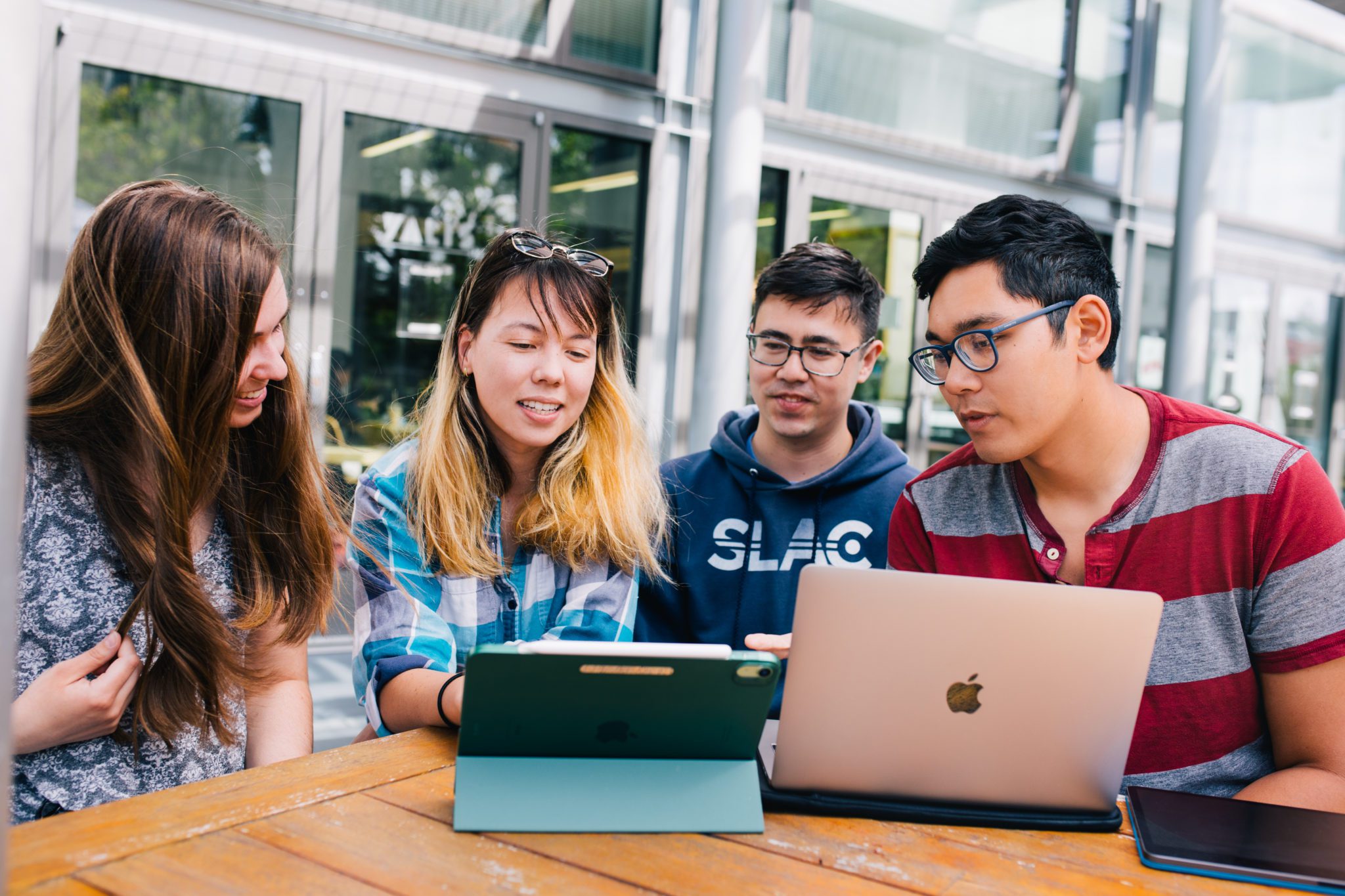What is SLAM?
Grad school is a great place to gain scientific expertise—but that’s hardly the only thing you’ll need in your future as a PhD. Are you ready to lead a group? Manage your coworkers? Mentor budding scientists? To address the many interpersonal issues that arise in a scientific workplace, grad students from Chemistry, Physics, and MCB founded SLAM: Science Leadership and Management.
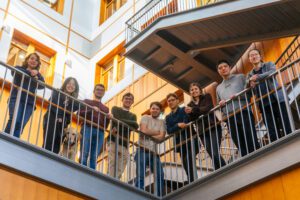
This is a seminar/workshop series focused on understanding the many interpersonal interactions critical for success in a scientific lab, as well as some practical aspects of lab management. The target audience for this course is upper-level science graduate students with broad interests and backgrounds, and the skills discussed will be applicable to a variety of career paths. Postdocs are also welcome to attend.
SLAM is sponsored by QB3 and VSPA, with additional support from the Department of Chemistry and the LBNL Chemical Sciences Division.
For more information, please contact SLAM leadership at berkeley.slam@gmail.com. You can also find us on Facebook, Twitter, and LinkedIn.
Spring 2024 SLAM panels and workshops
Description: Design thinking is a tool used in innovation and abstract problem spaces. Learn about using design thinking to explore how to create a sustainable life and work where you thrive. Learn tools to help you navigate your career path, get unstuck, and try out easy changes to increase your well-being and satisfaction.
Bio: Dr. Rebecca Andersen is a career development leader and researcher for equity in STEM, using design thinking to help people connect to meaningful work and foster inclusive and accessible career development. A career changer herself, Rebecca started her journey in engineering before pivoting to learning and development and supporting others in their STEM journeys. Rebecca serves as Sr. Director for Career Development at the UC Berkeley Graduate School of Information, ensuring students and alumni can launch and advance their careers – furthering equitable practices wherever people interact with information and technology. Rebecca is passionate about equity and inclusion in career development and leadership advancement and also created the Leadership Development Program for Gender Equity. In her spare time, Rebecca chases after 2 kids, is a soccer mom and Girl Scout volunteer, and serves as a PTA VP of Legislation.
Fall 2023 SLAM panels and workshops
Description: What is it like to work at a DOE national laboratory? What is a national laboratory? Are they all the same? Come find out! The format of this seminar will be ~30 min presentation followed by a Q&A session. To submit questions before the seminar, please fill out the following google form link!
Bio: Dr. Mark Allendorf is a Senior Scientist in the Center for Chemistry, Combustion, and Materials Science at Sandia National Laboratories in Livermore, CA, where he is Co-Director and founder of the DOE Hydrogen Materials Advanced Research Consortium (HyMARC), involving >60 research staff, postdocs, and students at five DOE National Laboratories. His primary research interests include hydrogen storage and hydrogen-material interactions; properties and applications of metal-organic frameworks (MOFs) for electronic devices, luminescence and radiation detection, gas sorption, and catalysis; and machine learning for materials discovery. He has also lead projects focused on the kinetics of chemical vapor deposition, high-temperature gas-phase thermochemistry, and catalytic combustion. Currently, he leads an integrated research team comprising experts in synthesis, quantum-chemistry, homogeneous catalysis, and metal-hydrogen interactions. His research has generated over 240 journal articles and proceedings papers, as well as 14 patents. He is Past President and Fellow of The Electrochemical Society and has received Sandia awards for research, leadership, and teamwork, as well as an R&D100 Award for a novel approach to radiation detection.
Monday, October 2nd, 5:30-6:30 in Stanley Hall 106. Snacks provided.
Description: The title of this presentation should suggest that I am clearly not an expert on the keys to success. Nevertheless, the presentation highlights my circuitous career path, a few of the “lessons” I have learned over the past 30 years, and the “things I know now” but “wish I’d known then.
Bio: Nancy Ryan Gray is the current President and Chief Executive Officer of the Gordon Research Conferences. Nancy received her B.S. degree in chemistry from the University of Notre Dame and her Ph.D. in Fuel Chemistry from The Pennsylvania State University. Prior to joining GRC, Nancy served as the Director of Membership at the American Chemical Society and as a Research Specialist in Organic Chemistry at Exxon Production Research Company. Nancy has served on the Board of Directors of Ligand Pharmaceuticals since August 2017. Ligand is a biopharmaceutical company focused on developing or acquiring technologies that help pharmaceutical companies in drug discovery, early-stage drug development, and product reformulation. Nancy has also served on the Board of Directors of Slater Technology Fund since March 2021. Slater is a not-for-profit seed fund dedicated to supporting new technology ventures founded by entrepreneurs to build companies that aim to achieve transformational impact in the industries or markets they serve. Nancy is recognized for her efforts in establishing and growing the Gordon Research Seminar (GRS) initiative to enable graduate students and postdocs to share in the GRC experience. The GRS is a two-day meeting designed specifically for early career scientists to present and discuss research and build collaborative relationships with colleagues. She is also recognized for founding the GRC Power Hour initiative as a forum for conversations to promote inclusion and addressing the challenges women and all underrepresented groups face in achieving equity in science. Nancy is the recipient of the 2013 Providence Business News Industry Leader Award for Non-Profit Organizations. Nancy is a Fellow of the Royal Society of Chemistry, a Fellow of the American Association for the Advancement of Science, and a member of the American Chemical Society. Nancy received an honorary Doctorate of Humane Letters from Colby-Sawyer College in 2019 for her leadership and the commitment she has offered to Gordon Research Conferences and the scientific community.
Description: Everyone delivers their science in their unique ways. As a graduate student or a post-doc, have you ever walked out of an awesome scientific talk and reflected to yourself, “That speaker was so good! How did they do that?” or perhaps the complete opposite? Have you ever wondered how to approach and practice for an upcoming talk? Join us in this seminar to learn what Dr. Glaunsinger has to say about delivering engaging scientific talks!
Bio: Britt Glaunsinger is a Professor and Class of 1963 Endowed Chair at the University of California Berkeley and an Investigator of the Howard Hughes Medical Institute, as well as a Fellow of the American Society for Microbiology. Her research is focused on understanding how viruses manipulate the gene expression landscape within an infected cell. She was named a UC Berkeley Miller Professor as well as a Chancellor Professor and has received numerous awards for her research, including the Howard Temin Award, the Burroughs Wellcome Foundation Investigators in the Pathogenesis of Infectious Disease Award, and the W.M. Keck Foundation Distinguished Young Scholars Award. She participates in several mentoring programs, is a member of five scientific advisory boards, and runs workshops on science communication for student and postdoc groups. Her dedication to mentorship has been recognized through receipt of the campus-wide UC Berkeley Graduate Division Distinguished Faculty Mentor Award. She is currently the Associate Chair of PMB.
Description of seminar: In a Rose Garden speech in June 2001, President George W. Bush acknowledged that globally averaged temperatures have increased. Also greenhouse gases have also been increasing. Yet, there are major uncertainties in the science. The Supreme Court case Massachusetts v EPA (2007) has been a notable success in climate policy. I shall discuss what I have learned about the role of climate science in climate policy.
Bio: Inez Fung is a Professor in the Department of Earth and Planetary Science, and the Department of Environmental Science, Policy and Management. She has been studying climate change and the carbon cycle for close to 40 years, and was a contributor to the IPCC 4th Assessment Report. She is currently a member of President Biden’s Council of Advisors on Science and Technology.
Description: How to apply for the faculty position and the transition from the mentee to mentor. Come find out!
Bios:
- Dr. Ziyang Zhang, Assistant Professor, University of California, Berkeley (2022–)
- Damon Runyon Postdoctoral Fellow, UCSF (2017–2020)
- Ph.D. Chemistry, Harvard University (2016)
- C&EN News Talented 12 (2021)
- Dr. Brooks Abel, Assistant Professor, Department of Chemistry, University of California Berkeley (since 2021)
- Postdoctoral Researcher, Cornell University (2017-2021)
- Ph.D. Polymer Science, The University of Southern Mississippi (2016)
Spring 2023 SLAM panels and workshops
Description: We’re in a decade in desperate need of empathetic science communication. In this talk, Sarah will cover how to reach tough audiences, where to connect with diverse audiences, and her science communication nonprofit, Skype a Scientist.
Bio: Dr. Sarah McAnulty is a squid biologist and science communicator. She received her PhD in molecular and cell biology working on Hawaiian bobtail squid symbiosis in 2019. She is currently the executive director of Skype a Scientist, a non-profit that connects over 10,000 classrooms to scientists every year. Dr. McAnulty is a prolific science communicator, with an active presence on Twitter, Instagram, Youtube, and Tiktok. She’s been featured by Nature, Forbes, NPR Shortwave, along with many others, for her work.
Monday, May 1st at 5:40 pm via Zoom.
Join the workshop:
What factors do you consider to be crucial to a researcher’s scientific endeavor? In addition to the drive and passion for science, research funding can also serve as an important foundation for a researcher’s scientific adventure. Fellowships, grants, awards, and other funding sources can provide not only the pivotal financial support for sustaining research activities, but they can also enhance community, build scholarly reputation, and open doors to new opportunities. Wondering how you can effectively identify and showcase your strengths for research funding, especially during different stages of a scientific career in academia?
Come hear how the following speakers fund their scientific careers!
- Jaquesta Adams – Graduate student in the Landry Lab | NSF GRFP recipient | HHMI Gilliam Fellow
- Naomi Latorraca, Ph.D. – Postdoctoral Scholar in the Marqusee Lab | Miller Fellow | NIH K99/R00 Awardee
- Chris Chang, Ph.D. – Professor of Chemistry & Molecular and Cell Biology | Extensive experience with funding including fellowships, grants, awards, prizes, and others!
Join us at the SLAM panel event, Funding Your Scientific Career, on Thursday, May 4th, 2023, from 12:30pm – 1:30pm at Stanley Hall Room 177 to hear from speakers who are currently at different stages of their scientific journeys! Refreshments will be provided at the event.
Helpful resources for SLAM members
- Sloan, W. (2007) Feedback That Works: How to Build and Deliver Your Message. Center for Creative Leadership.
- Kirkland, K. & Manoogian, S. (1998). Ongoing Feedback: How to Get It, How to Use It. Center for Creative Leadership.
- Cannon, M. & Witherspoon, R. (2005). Actionable feedback: Unlocking the power of learning and performance improvement. Academy of Management Executive, 19(2), 120-134.
- Cartwright, T. (2003). Managing Conflict with Peers. Center for Creative Leadership.
- Sharpe, D. & Johnson, E. (2007). Managing Conflict with Your Boss. Center for Creative Leadership.
- Gallagher, R. (2009). How to tell anyone anything: Breakthrough techniques for handling difficult conversations at work. New York: AMACON.
- Dealing with difficult people HBS Results-driven Manager Series
Grove, C. & Hollowell, W. (2002). The seven balancing acts of professional behavior in the United States.
Past SLAM seminars:
Ann Reid believes that science is for everyone. As the Executive Director of the National Center for Science Education, Ann works to ensure that what is taught in science classrooms and beyond is accurate and consistent with the best current understanding of the scientific community.
Prior to joining NCSE, Ann worked for 15 years as a research biologist at the Armed Forces Institute of Pathology, where she was responsible for sequencing the 1918 influenza virus. She also served as a Senior Program Officer at the National Research Council’s Board on Life Sciences for five years and then, most recently, as director of the American Academy of Microbiology — in both roles she oversaw major efforts aimed at communicating science to the public.
Despite decades of efforts to diversity STEM, many of these efforts focus on race and gender without substantive discussion of people with disabilities and accessibility. What practical strategies can we take inside and outside of the classroom to increase the accessibility of STEM education and careers? This presentation will provide some background information on disability and accommodations, universal design of learning, teaching about accessibility, and resources related to accessibility and disability in STEM.
Through her work at the DO-IT Center at the University of Washington, Brianna Blaser works to increase the participation of people with disabilities in science and engineering careers. She is the associate director for AccessComputing and AccessADVANCE. Her work includes direct interventions for individuals with disabilities and working with faculty, employers, and other stakeholders to create institutional change. Previously, Brianna was Project Director of Outreach for AAAS & Science Careers where she promoted Science Careers resources though career and professional development workshops to students, postdocs, and early career scientists. Brianna earned her PhD in Women’s Studies at the University of Washington in 2008.
David Jaramillo completed his PhD at UC Berkeley with Professor Jeffrey Long as an NSF Graduate Research Fellow. In the Long group, David worked on developing new metal–organic frameworks that engage in strong orbital interactions for gas storage and gas separations. He is the co-founder and CTO of Verne, a Bay Area startup developing hydrogen solutions for the heavy-duty transportation sector. He is also a Breakthrough Energy Innovator Fellow. Before graduate school, David studied chemistry and philosophy at Harvard.
Do you know anyone who is ever worked in consulting? Were you also confused about what such a generic title (consultant) means and what these people actually do for work? More importantly, did you know that there quite a few scientific PhDs who work in consulting?
Your week is already busy with benchwork in the lab, applying for fellowships, and dodging your PI’s messages. The last thing you want to do is research this whole new field. Let me help there. Come by for this intimate chat where we’ll talk about what consulting is, how do you transfer PhD skills to the workplace, and what does it logistically look like when applying to consulting.
Aqil worked as a Consultant for 4 years for Bain across the USA and the Middle East. He was trained as quantitative economist at Brown University and recently deferred his MBA at MIT’s Sloan School of Management to pursue a biotech startup in the Bay Area.
James Nuñez is an Assistant Professor in the Department of Molecular & Cell Biology, a Hanna Gray Fellow of the Howard Hughes Medical Institute, and an Investigator of the Chan Zuckerberg Biohub. The core interest of his research group is to understand the regulatory principles of the human genome. Specifically, the Nuñez lab investigates the molecular principles underlying epigenetic memory and inheritance in mammalian cells: how cells establish the ‘epigenome’ to control gene expression programs; how the epigenome maintained and remodeled as cells divide and differentiate; and how defects in these pathways lead to disease. The Nuñez lab combines functional genomics CRISPR screens, cell biology, and biochemistry to answer their research questions. Concurrently, the Nuñez lab develops and applies CRISPR-based programmable technologies for editing the epigenome by writing/erasing DNA and histone modifications at any genomic locus, enabling perturbations of gene expression programs without changing the DNA sequence of the human genome.
What are community colleges? What is it like to work at a community college in STEM?
Lori Silverman is the STEM (Science, Technology, Engineering, & Mathematics) Division Dean at Ohlone College. As the dean, she oversees 13 departments, supervises over 100+ students, faculty, and staff, and manages the educational programs and budgets of these departments along with the division. Prior to being a dean, Silverman was a math faculty for 16 years at Foothill College and principal investigator for three NSF (National Science Foundation) grants.
Silverman was born in Saigon. Her family escaped Vietnam in the summer of 1979. They spent a week at sea and eventually were picked up by the US navy and dropped off at a refugee camp in Bangkok, Thailand. After three months, Silverman and her family flew in an American Airline plane and landed in San Francisco, CA. Her family has moved around from San Francisco to upstate New York to Louisiana back to Los Angeles, California. Silverman became a US citizen when her family was in New York.
Silverman has two kids, one girl, and one boy. Her daughter is in college and her son is in high school. Her husband, whom she met in college and married in graduate school, works in the science industry.
Academic publishing is dynamic, with rapid changes over the past several years being driven by open science, technological innovation, funding mandates, and efforts to increase transparency and inclusivity. These changes combined with recent growth in the broader field of scholarly communication provide career options as diverse as the many niches and sub-fields of research that are published every day. This presentation will highlight emerging trends in academic publishing, career opportunities associated with these changes, and how to leverage an academic background to achieve a rewarding career in scholarly publishing.
Part of the US Publishing Development Team for Frontiers, a multidisciplinary open-access publisher, Avriel (Avy) Licciardi supports seven journals in the Physical Sciences and Engineering program as an Editor Outreach Manager. Her team works to build diverse editorial boards to support and enhance the experiences of authors and reviewers, as well as contribute to making science open. Passionate about open science and author education, Avy prioritizes career and professional development resources for students and early career scientists. Avy earned her Ph.D. in Geological Sciences from the University at Buffalo in 2018 following her Master’s in Geology from the University of New Hampshire in 2013.
Please subscribe the SLAM’s email newsletter to follow rescheduling updates for this event. Would you like to learn more about a career in engineering and scientific consulting? Would you like to use your technical background to provide timely, reliable insight and solutions for complex engineering and scientific problems? We will discuss our personal journey from academia to technical consulting, including what has drawn us to technical consulting, how academia prepared us for this career, how we thrive in this fast pace and dynamic environment that challenges us every day, and things we have learned along the way.
Jess uses her chemistry background to help clients with failure analysis of materials ranging from medical devices and consumer products to food and construction materials all around the globe. Other than industry clients, Jess also works with law firms to provide litigation support services. She earned her PhD in Chemistry at UC Berkeley (Chemical Biology Program) and joined Exponent in 2016.
Bo helps clients with engineering and clinical studies that are aimed to develop new wearable technologies for health and fitness tracking. Additionally, Bo has extensive experience in mechanical testing of biological tissues and polymeric materials. Prior to joining Exponent in 2018, he earned his PhD in Biological Engineering at MIT. He is also a Berkeley alum (BioE & MSE joint major, class of 2013).
Spring 2022 SLAM Workshops
Science can be both engaging and empirical – if you know how to distill a cohesive story! Translate your technical content or personal experience into a story that is meaningful, memorable, and accurate. In this intensive workshop, each participant will draft and get feedback on a story treatment about a topic of choice. Great for developing a piece of writing or a presentation in any format.
Sara ElShafie is a global change biologist and science storytelling coach. She collaborates with artists in a wide range of industries to uncover the potential of storytelling to engage broad audiences with complex topics. ElShafie is the Founder and Principal of Science Through Story, LLC, dedicated to helping scientists and science educators connect with audiences through effective storytelling. She offers workshops and coaching for audiences ranging from graduate students to NASA scientists to theme park executives. She also organized a symposium, Science Through Narrative: Engaging Broad Audiences, with speakers from the scientific community as well as arts and entertainment industries, and curated a resulting published volume of open access papers. ElShafie holds a B.A. in Biological Sciences from the University of Chicago and a M.S. in Earth & Atmospheric Sciences from the University of Nebraska, Lincoln. She completed her doctoral research in Integrative Biology with the Museum of Paleontology at the University of California, Berkeley, and will receive her Ph.D. in May 2022.
Ever get frustrated with a lack of action in the face of crises? Curious about why so many unscientific policies get passed- and how to stop them? How does science influence policy, and how does policy influence science? SLAM and the SPG are collaborating to bring you a workshop on how to make a difference with (and in) Science Policy. The workshop provides early career scientists and engineers with:
- an introduction to science policy, including career opportunities and how to make an impact on policy decisions.
- an introductory overview of local government structures and the opportunities for individuals to get involved.
Fall 2021 SLAM Workshops
Monday, September 13, 5:30 p.m. – 7:00 p.m.
Katie Peek (she/her), Freelance data visualization designer and contributing artist at Scientific American
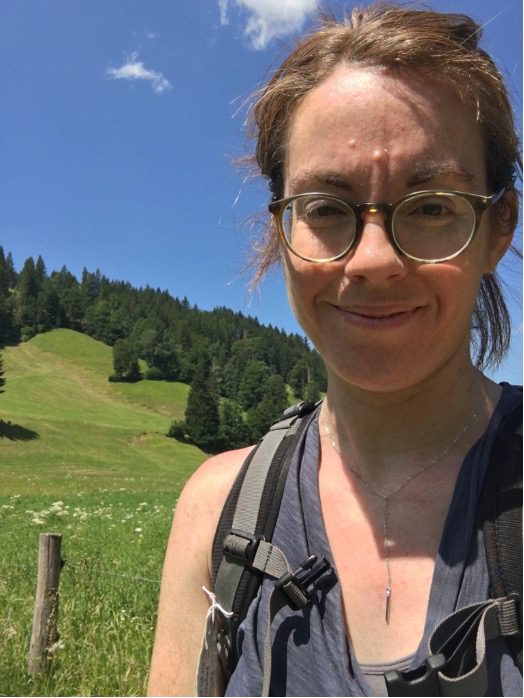 Want to help others see what you see in your data? Design principles are here to help! I’ll cover the basics of good chart design and discuss what I do in my own work to help a visual shine.
Want to help others see what you see in your data? Design principles are here to help! I’ll cover the basics of good chart design and discuss what I do in my own work to help a visual shine.
Katie creates data visualizations on science topics for general-interest magazines. Her background includes an astrophysics Ph.D. from U.C. Berkeley and a science journalism degree from NYU. She’s been working as a visual journalist for the past decade, first at Popular Science magazine and independently since 2016. She contributes to Scientific American, Audubon Magazine, and the New York Times magazine, among others. She also writes articles and illustrates books, as well.
Please email berkeley.slam@gmail.com to receive the Zoom link to this event.
Monday, September 20, 5:30 p.m. – 7:00 p.m.
Dr. Anita Marshall (she/her), University of Florida Department of Geology
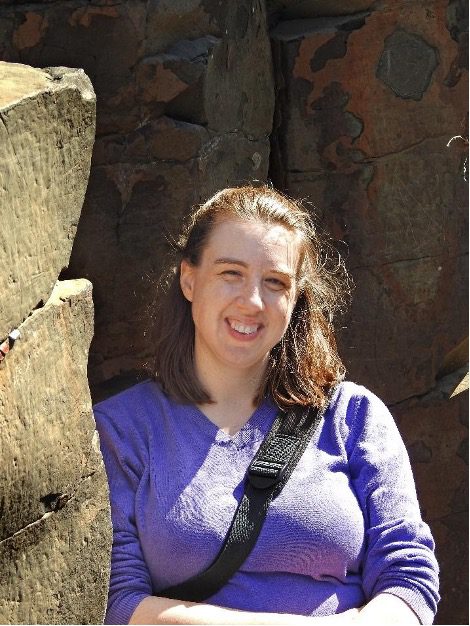 The geosciences has traditionally been a challenging degree path for people with disabilities. Long hours outdoors in the remote field environments, inaccessible labs, and even the format and presentation of classroom materials can present significant barriers. But access is more than just ramps and tactile graphics, it is also about feeling welcome in a discipline that has long favored active, outdoorsy people. This presentation will explore some of the recent initiatives that are addressing these barriers to create more accessible and inclusive learning environments for students with disabilities in the geosciences.
The geosciences has traditionally been a challenging degree path for people with disabilities. Long hours outdoors in the remote field environments, inaccessible labs, and even the format and presentation of classroom materials can present significant barriers. But access is more than just ramps and tactile graphics, it is also about feeling welcome in a discipline that has long favored active, outdoorsy people. This presentation will explore some of the recent initiatives that are addressing these barriers to create more accessible and inclusive learning environments for students with disabilities in the geosciences.
Dr. Anita Marshall is a Lecturer and researcher in the Department of Geological Sciences at the University of Florida. Her primary research area focuses on accessibility and engagement in geoscience classrooms and field courses. As the Director of Operations for the non-profit International Association for Geoscience Diversity (theIAGD.org), she works to identify and address accessibility barriers and serves as a mentor and advocate for geoscience students and professionals with disabilities.
Please email berkeley.slam@gmail.com to receive the Zoom link to this event.
Monday, September 27, 5:30 p.m. – 7:00 p.m.
Shae Ziaee, Ph.D. (she/her), Innovation Ventures at University of California, San Francisco
In this presentation, Shae will share how she found her path to her dream job. She will highlight the key skill sets that helped her to transition from an academic career to the biotech industry, and what she would do differently.
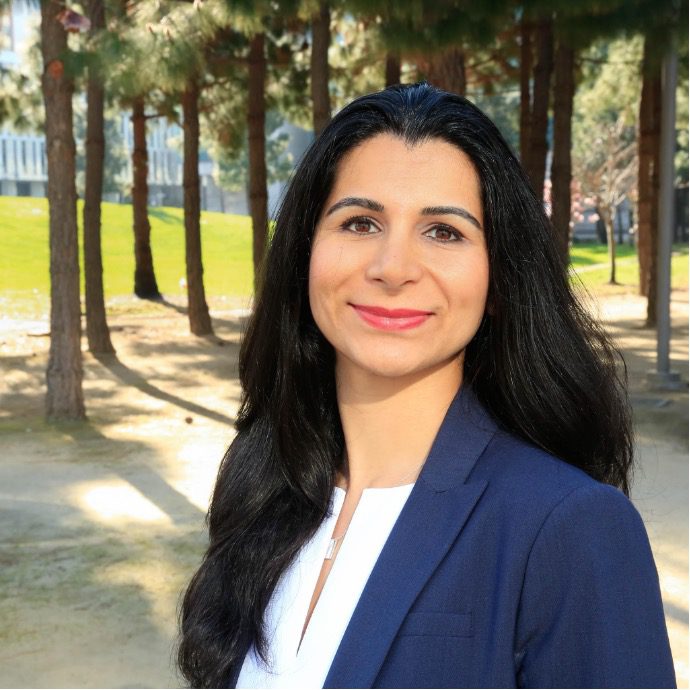 Dr. Ziaee is a cancer biologist who completed her doctorate at Cedars-Sinai Medical Center, and a postdoc at UCSF in the Department of Radiology Oncology. Her scientific research focused on developing and characterizing tumor microenvironment histological features using 3D tumor organoid and machine learning models with the goal of predicting treatment response in patients. She joined life science strategy and market research consulting in 2016, developing & executing R&D business plans across multiple therapeutic areas, including hematological and solid tumors, infectious, and rare diseases. Dr. Ziaee joined UCSF Innovation Ventures as their Business Development and Alliance Manager in early 2021, where she evaluates, negotiates, and executes R&D and early-stage drug discovery partnerships with external industry partners.
Dr. Ziaee is a cancer biologist who completed her doctorate at Cedars-Sinai Medical Center, and a postdoc at UCSF in the Department of Radiology Oncology. Her scientific research focused on developing and characterizing tumor microenvironment histological features using 3D tumor organoid and machine learning models with the goal of predicting treatment response in patients. She joined life science strategy and market research consulting in 2016, developing & executing R&D business plans across multiple therapeutic areas, including hematological and solid tumors, infectious, and rare diseases. Dr. Ziaee joined UCSF Innovation Ventures as their Business Development and Alliance Manager in early 2021, where she evaluates, negotiates, and executes R&D and early-stage drug discovery partnerships with external industry partners.
Please email berkeley.slam@gmail.com to receive the Zoom link to this event.
Monday, October 4, 5:30 p.m. – 7:00 p.m.
Cindy Hong, (she/her), Senior Scientist at Merck & Co.
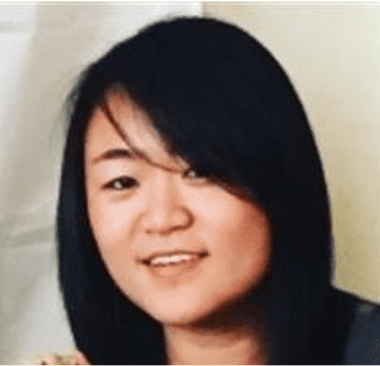
I will briefly introduce my career path, starting from the discovery of my love for chemistry to my role in industry today. I’ll share what led me to make the decisions I did (both professionally and scientifically), things I wish I’d known, and things I am still trying to learn. The connecting thread along the somewhat unusual scientific path I’ve taken comes down to really enjoying thinking about problems from a physical organic perspective, and surrounding myself with excellent scientists and mentors that encourage pushing beyond the boundaries of traditional fields.
Cindy earned her BA/MS in 2013 from Northwestern University working in chem bio and organic methods with Prof. Alexander Statsyuk. She then joined the labs of Prof. F. Dean Toste, Prof. Ken Raymond, and Prof. Bob Bergman at UC Berkeley to study biomimetic supramolecular catalysts. After earning her PhD in 2018, Cindy joined Process R&D as a Senior Scientist in Process Chemistry, where she developed a route to 2-fluoroadenine in support of the Islatravir program. In 2021, Cindy joined the Biocatalysis group within the Process Chemistry department.
Please email berkeley.slam@gmail.com to receive the Zoom link to this event.
Monday, October 13, 5:30 p.m. – 7:00 p.m.
Tori Sharma, PhD (she/her), Program Manager for Responsible Conduct in Research, Research Administration and Compliance
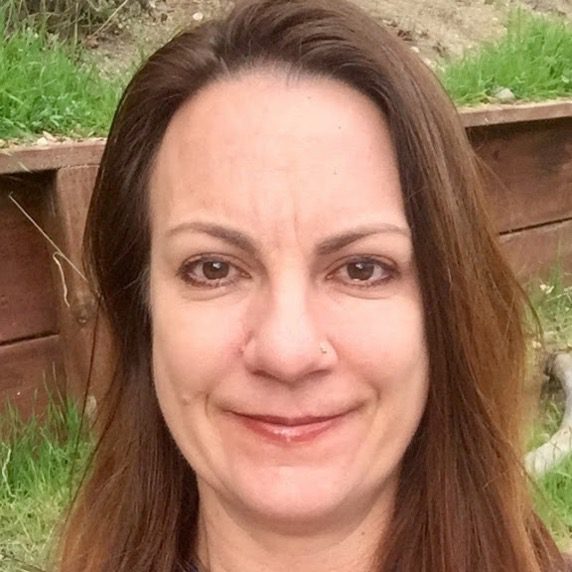 Maintaining research integrity within a research group is critical to the quality and reproducibility of the data produced. Leadership, responsible mentorship, appropriate training, and effective communication are key components towards achieving an environment that fosters scientific integrity. Join me for a discussion about enhancing these skills.
Maintaining research integrity within a research group is critical to the quality and reproducibility of the data produced. Leadership, responsible mentorship, appropriate training, and effective communication are key components towards achieving an environment that fosters scientific integrity. Join me for a discussion about enhancing these skills.
Tori is the Program Director for Responsible Conduct in Research at UC Berkeley. Formerly Program Director for Biotechnology, Mathematics and Green Chemistry at UC Berkeley Extension, she has extensive experience in career counseling and professional-development programs both in industry and academia, as well as experience in mentoring, teaching and academic program creation and execution. Previously, she has held positions as a researcher and project leader at Novartis Vaccines and Diagnostics and at Chiron Corporation. She was also a fellow at Genentech after receiving her doctorate degree in biochemistry and biophysics from UC Berkeley. Victoria has been teaching, managing, and developing research integrity courses at Berkeley since 2011.
Please email berkeley.slam@gmail.com to receive the Zoom link to this event.
Spring 2021 SLAM Workshops
Monday, February 22, 10 a.m. – 11:30 p.m.
Teaching diverse populations of students requires instructors to construct learning environments that are inclusive and equitable. Research in psychology and other disciplines suggests that how students personally experience learning environments strongly influences engagement, motivation, sense of belonging, and conceptual learning. In this interactive workshop, participants will share a common experience as the basis for discussing how students may experience classroom environments differently from one another. Individual participants will then have the opportunity to self-assess their current awareness of 21 common equitable teaching strategies and identify those that could be immediately implemented in their classrooms.
Please email berkeley.slam@gmail.com to receive the Zoom link to this event.
Monday, March 8, 1:30 p.m. – 3:00 p.m.
In the course of any academic career, one has to start, develop, and sustain effective collaborations that benefit both the investigators and students alike. How does one go by fostering such collaborations, be it on the scale of individual labs across campus, cross-institutional collaborations, or large-scale groups and consortiums sustained by grants like NSF? In this workshop, you will learn about the challenges, benefits, and everything in-between from experienced leaders in the field.
Please email berkeley.slam@gmail.com to receive the Zoom link to this event.
Thursday, April 29, 12:30 p.m. – 2:00 p.m.
This workshop introduces effective methods of negotiating with potential employers. Topics include basic elements of the negotiation process, how to leverage your strengths, avoid common pitfalls, handle multiple offers, and successfully close the deal.
Please email berkeley.slam@gmail.com to receive the Zoom link to this event.
Fall 2020 SLAM Workshops
Monday, November 30
Dr. Malcolm Hill, Bates College
Many scientists working on their Ph.D. are familiar with research intensive institutions and may limit faculty searches to these types of universities. Liberal arts colleges offer attractive career paths that allow for serious scholarship, exciting teaching opportunities, and membership in a supportive community. Dr. Hill will present his experiences as a scholar and teacher at 3 liberal arts institutions, will discuss how he moved into administrative positions, and will share how search and tenure and promotion processes work at these institutions.
Please email berkeley.slam@gmail.com to receive the Zoom link to this event.
Monday, December 7
Martin Mulvihill PhD, Founder, Safer Made Venture Capital
Venture capital may not be a common career path for PhD chemistry students, but learning about how venture capital fits into the funding ecosystem is valuable to anyone interested in how innovations are commercialized. This talk will share some of my own journey from an academic career path to the creation of Safer Made, a mission driven venture capital fund focused on the elimination of hazardous chemicals from consumer products and supply chains. I will discuss entrepreneurship in chemistry, the demand for safer chemistry solutions from the marketplace, and the opportunity for early career scientists to make a positive impact on the future of chemistry.
Please email berkeley.slam@gmail.com to receive the Zoom link to this event.
Spring 2020 SLAM Workshops
Fall 2019 SLAM Seminars
Monday, September 9
Joe Charbonnet, Green Science Policy Institute
Monday, September 16
Arman Zand, Farmstead
Monday, September 23
Meg Fasulo, Bartlit Beck LLP
Monday, September 30
Phil Buhlmann, University of Minnesota
Monday, October 21
Allegra Liberman-Martin, Chapman University
Alanna Schepartz recently joined the faculty in the department of chemistry at UC Berkeley after 30 years on the faculty at Yale. Her lab works in several areas of chemical biology, and she is leading a complex, multi-PI effort to synthesize unusual and interesting new molecules using the ribosome: a wonderful combination of Science, Leadership, & Management!
Monday, November 4
Ajay Virkar, C3Nano
In this talk, C3Nano’s progression from a university spin-out into a fully operational advanced materials company with the industry’s leading technology, a global footprint, and a successful track record for commercialization of various products, will be discussed.
Monday, November 18
Hanadie Yousef, Juvena Therapeutics
Dr. Yousef will discuss the stages of creating and building a biotechnology startup, from generating an idea and business model, networking, laying the foundations, fundraising and recruiting a team. She will share tips and lessons learned from the last 3 years on this journey.
Monday, November 25
L.-C. Campeau, Merck
We are often taught that the best plan wins. We see it in movies and sports all the time. From high school, career counselors help us plan to get into the best college, then best graduate school and ultimately through to our professional lives. L.-C. Campeau’s experience is quite the opposite. This talk will meander through the peaks and valleys of his formal training and professional career. He will share some of his thoughts on personal development and key insights from his last 12 years in professional life.
Jen Heemstra, Emory University
This seminar will be a lively discussion about work approaches in graduate school, benefits of proper communication with your peers, and how to navigate the long academic journey. You can follow Jen on Twitter @jenheemstra for her experiences and leadership advice!
